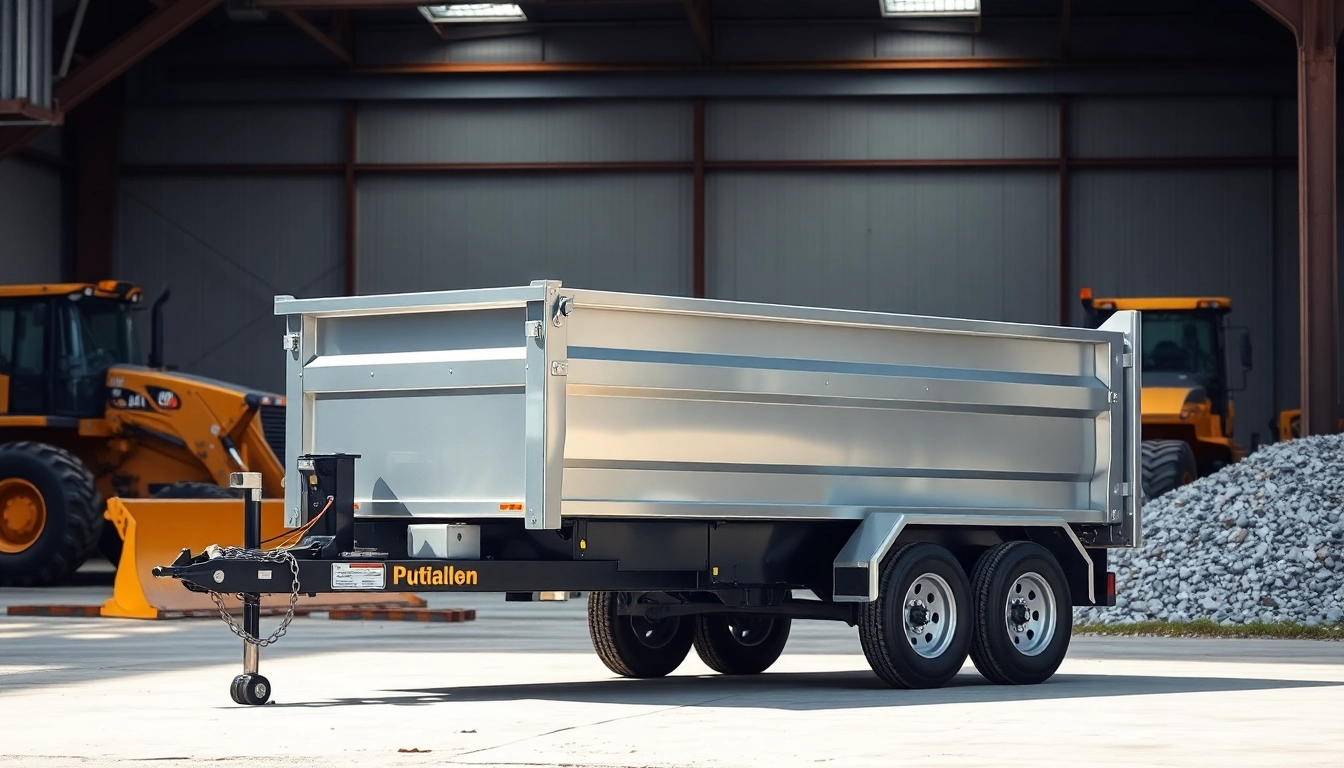1. Understanding Hydraulic Dump Trailers
What is a Hydraulic Dump Trailer?
A hydraulic dump trailer is a versatile tool that allows users to transport heavy loads efficiently and safely. It features a hydraulic system that enables the trailer bed to tilt upward, dumping its contents with ease. These trailers are particularly popular in construction, landscaping, and agricultural applications where material handling is a common task. The design not only minimizes manual labor but significantly speeds up the unloading process, making hydraulic dump trailers a preferred choice for many professionals.
Key Components of Hydraulic Dump Trailers
Understanding the components of hydraulic dump trailers is essential for potential buyers. Key elements include:
- Hydraulic Cylinders: Responsible for lifting the trailer bed, typically powered either by a battery or a hydraulic pump.
- Frame: The structural backbone, usually made from steel or aluminum, which is designed to handle heavy loads.
- Axles: Essential for stability during transit and unloading; they can vary from single to tandem axles based on trailer size and capacity.
- Hitch: Connects the trailer to the towing vehicle; various types exist, including gooseneck or bumper pull.
Advantages of Using Hydraulic Dump Trailers
Hydraulic dump trailers have numerous benefits which contribute to their popularity:
- Efficiency: Hydraulic systems enable quicker unloading compared to manual methods.
- Reduced Labor: Less physical strain is required, making the job safer and easier for operators.
- Versatility: Capable of transporting mulch, sand, gravel, debris, and more, adapting easily to different job requirements.
- Customizable: Many manufacturers offer options for customization, allowing buyers to select specific features suited to their needs.
2. Types of Hydraulic Dump Trailers
Single Axle vs. Tandem Axle Trailers
When it comes to hydraulic dump trailers, one critical choice is between single axle and tandem axle configurations:
- Single Axle Trailers: Generally lighter and easier to maneuver, these trailers are ideal for smaller loads (typically up to 5,000 lbs). They are excellent for residential projects or light commercial use.
- Tandem Axle Trailers: These trailers offer greater weight capacity (ranging from 7,000 lbs to over 20,000 lbs). They provide additional stability and are better suited for heavy-duty applications.
Steel vs. Aluminum Trailers
The choice between steel and aluminum trailers often comes down to durability and weight considerations:
- Steel Trailers: Generally more robust and suitable for heavy hauling, steel trailers can withstand rugged conditions. However, they are heavier and susceptible to rust if not properly maintained.
- Aluminum Trailers: Lightweight and corrosion-resistant, aluminum trailers make tow vehicles more fuel-efficient. Although they may not hold up under extremely heavy loads as well as steel trailers, they are ideal for lighter uses.
Dump Trailer Sizes: Choosing the Right One
Size is an essential factor when selecting a hydraulic dump trailer. Common dimensions include:
- In lengths from 5 to 16 feet.
- Widths typically ranging from 5 to 8 feet.
Choosing the right size hinges on the nature of your work and the amount of material you typically transport. For residential gardeners, smaller sizes are sufficient; contractors may need larger trailers for bulk material.
3. Features to Look for in Hydraulic Dump Trailers for Sale
Hydraulic Lift Systems: Power and Performance
A robust hydraulic lift system is vital for effective operation. The best systems offer:
- Power-Up/Power-Down Capability: This allows for smooth operation when raising and lowering the trailer bed.
- Remote Control: Many modern hydraulic systems come with wireless remote control options for increased convenience during operation.
Weight Capacity and Load Distribution
Understanding the weight capacity and ensuring proper load distribution is essential for safe operation. Factors to consider include:
- GVWR (Gross Vehicle Weight Rating): Make sure your chosen trailer can handle both the trailer’s weight and the load.
- Load Distribution: Evenly distributed loads prevent sway and improve towing stability.
Towing Compatibility: What You Need to Know
When selecting a hydraulic dump trailer, check for towing compatibility with your vehicle. Different trailers require different towing systems which may include:
- Bumper Pull: Ideal for lighter trailers; easy to use and requires little additional equipment.
- Gooseneck: Generally provides better weight distribution and stability for heavier loads.
4. How to Maintain Your Hydraulic Dump Trailer
Regular Inspection and Safety Checks
To ensure reliability and safety, routine inspections are essential. Consider the following:
- Inspect hydraulic lines, checking for leaks or damage.
- Ensure the wiring and plug connections are secure and functioning properly.
- Check the structural integrity by looking for cracks, rust, or significant wear and tear.
Proper Lubrication and Hydraulic System Maintenance
Maintaining the hydraulic system is crucial for performance. Recommendations include:
- Regularly check and replace hydraulic fluid as per the manufacturer’s guidelines.
- Lubricate hinges and any moving components to ensure smooth operation.
Common Issues and Repair Tips
Be aware of common issues that can arise with hydraulic dump trailers, such as:
- Hydraulic Leaks: Often caused by worn hoses. Replace damaged hoses immediately.
- Poor Tipping: May indicate hydraulic problems or improper loading. Check for load distribution and hydraulic system efficiency.
5. Finding the Best Deals on Hydraulic Dump Trailers
Where to Shop: Online vs. Dealerships
When looking to purchase, consider both online platforms and local dealerships. While online marketplaces may offer competitive pricing, dealerships can provide warranties and after-sale support. A reliable source for hydraulic dump trailers for sale can educate buyers about the features and post-sale service they offer.
Understanding Pricing and Negotiation Tactics
Prices for hydraulic dump trailers can vary widely based on size, brand, and features. To secure the best deal, consider the following negotiation strategies:
- Research similar models to benchmark pricing.
- Be open to negotiation on price and inquire about any available financing options.
Reviews and Recommendations: Making Informed Choices
Before making a purchase, it’s advisable to explore user reviews and expert recommendations. Look for trailers that receive high ratings for:
- Durability and reliability.
- Performance under demanding conditions.
- After-sale service and support.
